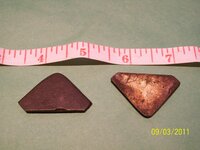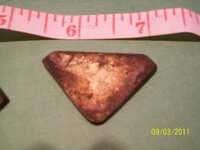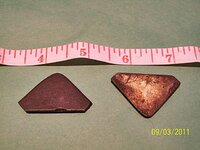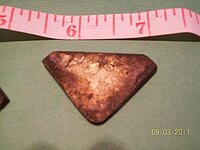hishergarrett
Jr. Member
I recently found these pieces of metal while detecting a mid 1800's housesite.I don't think that they are of the same age though.They are about 1.5 inches wide at the widest and are about 1/8 " thick and are very heavy for their size.There was 30 of them in the same hole about 12 inches deep.When scratched,they are very silvery and shiny.They were not rusted but will stick to a magnet.I have asked a lot of people but noone can tell me what they are.I hope someone here can help.Thanks.










